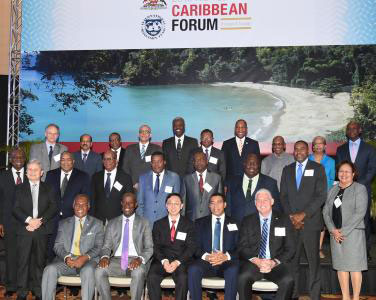Caribbean leaders and IMF Discuss Challenges and Opportunities of Shifting Global Economic Outlook.
Caribbean Prime Ministers, Finance Ministers and Central Bank Governors gathered today in Port of Spain, the capital of Trinidad and Tobago, for the fifth Caribbean Forum. The region’s leaders joined representatives from the private sector and international organizations to discuss how countries in the region can respond to a complex international economic outlook that involves lower commodity prices, a softer than expected recovery in the United States, Cuba’s opening on the region, and the threat of losing financial relations with global banks. The high level conference, “Shifting Tides: Challenges and Opportunities,” was co-organized by the International Monetary Fund (IMF) and the Government of Trinidad and Tobago.
“Global economic developments, such as low oil prices, have major implications for the Caribbean,” said IMF Deputy Managing Director Tao Zhang, who delivered the conference’s opening speech. “Commodity exporting countries like Suriname and Trinidad and Tobago have been hit hard.” At the same time, lower prices have benefited many of the region’s oil importers. Jamaica has eliminated much of its double-digit current account deficit in just three years. And Guyana is experiencing its first external current account surplus in decades. The IMF, Mr. Zhang added, is “deeply committed to helping Caribbean countries navigate these challenges.”
“The Caribbean will not be able to achieve faster economic growth and sustainable development unless the problem of debt overhang is addressed in a comprehensive way,” Trinidad & Tobago Prime Minister Keith Rowley lamented in his welcome speech.
Growth, competitiveness and oil prices
Participants in the conference’s first panel discussed how to respond to a global outlook framed by low but stable commodity prices, which affects commodity importers and exporters differently, and a subdued recovery in advanced economies that remains a drag on the Caribbean tourism sector. On the plus side, low interest rates in advanced economies could help countries in the region to reduce their cost of financing. Jamaica, Grenada, and St. Kitts and Nevis have achieved important results reducing their fiscal and external vulnerabilities over the last few years. Other regional challenges include significant exposure to climate change and natural disasters, as evident from Hurricane Matthew most recently, and the need to improve financial soundness and ensure the resilience of domestic financial systems.
Spillovers from Cuba
The normalization of Cuba’s relations with the United States will significantly affect other Caribbean countries. Participants in the second panel noted that tourism-dependent countries that are heavily dependent on U.S. visitors could see a significant loss of arrivals, according to preliminary analysis by the IMF. The estimated loss is likely to be much smaller if the surge in U.S. visitors is accompanied by a significant increase in the cost of tourism in Cuba. Based on past experiences, however, such as the emergence of the Dominican Republic as a major tourist destination, the long-run impact could be muted. Exploring synergies and complementarities will help integrate Cuba into the broader Caribbean tourism industry.
How to address de-risking?
Addressing the loss of correspondent banking relationships (also often called de-risking) is an urgent issue for the Caribbean. As the Forum’s last panel highlighted, effective implementation of Anti-Money Laundering and Combating Financing of Terrorism (AML/CFT) remains a challenge in many countries, despite progress in adopting some international standards. As discussants noted, technology can help reduce compliance costs, seen as one of the key factors contributing to loss of correspondent banking relationships, especially in smaller jurisdictions. Banks have already invested significant resources into better technology to increase transparency, lower costs, and promote information sharing, while addressing AML/CFT concerns.
“We believe a solution to this issue requires dialogue between countries, regulators and banks, and increased information exchange,” Mr. Zhang said in his opening remarks. “This can help clarify regulatory expectations, build trust, facilitate capacity building, and highlight best practices.”





